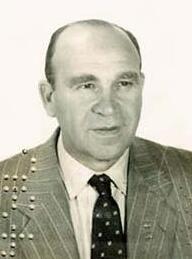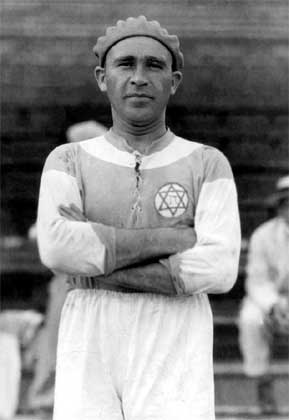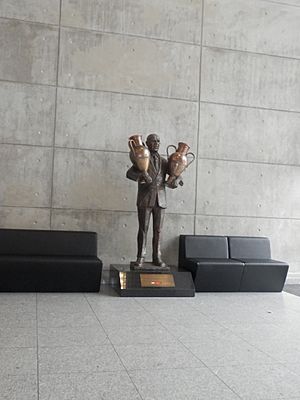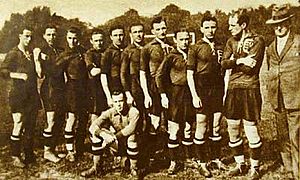Béla Guttmann facts for kids

Guttmann in 1953
|
|||
| Personal information | |||
|---|---|---|---|
| Full name | Béla Guttmann | ||
| Date of birth | 27 January 1899 | ||
| Place of birth | Budapest, Austria-Hungary |
||
| Date of death | 28 August 1981 (aged 82) | ||
| Place of death | Vienna, Austria | ||
| Position(s) | Centre-half | ||
| Youth career | |||
| 1917–1919 | Törekvés SE | ||
| Senior career* | |||
| Years | Team | Apps | (Gls) |
| 1919–1920 | Törekvés SE | 17 | (0) |
| 1921–1922 | MTK Hungária | 16 | (1) |
| 1922–1926 | Hakoah Wien | 96 | (8) |
| 1926 | Brooklyn Wanderers | ||
| 1926–1929 | New York Giants | 83 | (2) |
| 1929–1930 | New York Hakoah | 21 | (0) |
| 1930 | New York Soccer Club | 22 | (0) |
| 1931–1932 | Hakoah All-Stars | 50 | (0) |
| 1932–1933 | Hakoah Wien | 4 | (0) |
| International career | |||
| 1921–1924 | Hungary | 4 | (1) |
| Managerial career | |||
| 1933–1935 | SC Hakoah Wien | ||
| 1935–1937 | Enschede | ||
| 1937–1938 | Hakoah Wien | ||
| 1938–1939 | Újpest | ||
| 1945 | Vasas | ||
| 1946 | Ciocanul București | ||
| 1947 | Újpest | ||
| 1947–1948 | Kispest | ||
| 1949–1950 | Padova | ||
| 1950–1951 | Triestina | ||
| 1953 | Quilmes | ||
| 1953 | APOEL | ||
| 1953–1955 | AC Milan | ||
| 1955–1956 | Vicenza | ||
| 1956–1957 | Honvéd | ||
| 1957–1958 | São Paulo | ||
| 1958–1959 | Porto | ||
| 1959–1962 | Benfica | ||
| 1962 | Peñarol | ||
| 1964 | Austria | ||
| 1965–1966 | Benfica | ||
| 1966–1967 | Servette | ||
| 1967 | Panathinaikos | ||
| 1973 | Austria Wien | ||
| 1973 | Porto | ||
| *Club domestic league appearances and goals | |||
Béla Guttmann (born January 27, 1899 – died August 28, 1981) was a famous Hungarian footballer and coach. He was born in Budapest, which was part of Austria-Hungary at the time. He was Jewish and survived a very difficult period during World War II.
Before the war, he played as a midfielder for clubs like MTK Hungária FC and S.C. Hakoah Wien. He also played for several teams in the United States. Guttmann even played for the Hungary national football team, including in the 1924 Olympic Games.
Guttmann became a coach in 1933 and worked in ten different countries until 1974. He won ten national championships and, most famously, two European Cups in a row with Benfica. He also coached national teams for Hungary and Austria. He is remembered for coaching big clubs like A.C. Milan, São Paulo FC, FC Porto, and C.A. Peñarol. His biggest success was leading Benfica to European Cup wins in 1961 and 1962.
He helped create the 4–2–4 formation in football, along with other Hungarian coaches. He also helped develop the legendary player Eusébio. Guttmann was known for moving between clubs often, saying, "the third season is fatal." He was once fired from AC Milan even when his team was at the top of the league! He also famously left Benfica after a disagreement about his pay.
Contents
Béla Guttmann's Early Life
Béla Guttmann was born in Budapest, Austria-Hungary. He was Jewish. At 16, he became a trained dance instructor.
Playing Career Highlights
Béla Guttmann's Club Football Journey
Guttmann was an important player for MTK Hungária FC in the early 1920s. He played as a halfback or center half. He helped MTK win Hungarian League titles in 1920 and 1921.

In 1922, Guttmann moved to Vienna, Austria. He joined an all-Jewish club called S.C. Hakoah Wien. He played for them as a centre back from 1922 to 1926 and again in 1933. Their team shirts were blue and white, like the Zionist movement, and they had a large Star of David badge. In 1925, Hakoah won the Austrian League.
In 1926, the SC Hakoah Wien team traveled to New York for a ten-game tour. A huge crowd of 46,000 people watched them play a game, which was a US record for soccer at the time. After the tour, Guttmann and some teammates decided to stay in the United States.
He played for several American teams, including Brooklyn Wanderers and the New York Giants. In 1929, he helped New York Hakoah win the U.S. Open Cup. He played 176 games in the American Soccer League before he retired as a player at 32.
While in New York, Guttmann also taught dance. He even invested in the stock market, but he lost a lot of money during the Wall Street Crash of 1929.
Béla Guttmann as a Hungarian International Player
Between 1921 and 1924, Guttmann played six times for the Hungary national football team. He scored a goal in his very first game against Germany in 1921.
He also played in the 1924 Olympic Games in Paris. Before the competition, Guttmann was unhappy because there were more officials than players on the Hungarian team. He even hung dead rats on the doors of the officials to show his disapproval!
Béla Guttmann's Coaching Career
Béla Guttmann coached 24 teams in ten countries from 1933 to 1974. He won two European Cups and ten national championships. He also coached the national teams of Hungary and Austria. As a coach, he was known for using the 4–2–4 formation. His teams played exciting, attacking football. He also made sure his players followed strict diets, stayed very fit, and trained hard.
Return to Europe and Wartime Challenges
Guttmann returned to Europe in 1932. Before World War II, he coached teams in Austria, the Netherlands, and Hungary. He had his first major success with Újpest FC in the 1938–39 season, winning the Hungarian League and the Mitropa Cup.
During World War II, Guttmann faced great danger. He hid in an attic in Hungary and was later sent to a labor camp near Budapest. He managed to escape in December 1944, just before being sent to a much worse camp. Sadly, his father and older sister were killed during this time.
After the war, Guttmann coached in Budapest and then in Romania. He even asked to be paid in vegetables because of food shortages! He often left clubs quickly if he disagreed with the management. In 1947, he won another Hungarian League title with Újpest FC. He later left Kispest AC after a disagreement with a player during a game.
Coaching in Italy
Like many Hungarian footballers and coaches, Guttmann spent time coaching in Italy. He coached for Calcio Padova and U.S. Triestina Calcio.
In 1953, he became the manager of A.C. Milan. Even with star players like Gunnar Nordahl and Nils Liedholm, Guttmann was fired during his second season, even though his team was at the top of the league! He famously told reporters, "I have been sacked even though I am neither a criminal nor a homosexual. Goodbye." After this, he always tried to include a special rule in his contracts: he could not be fired if his team was winning. He later managed another Italian club, Vicenza Calcio.
Coaching in South America
Guttmann first visited South America in 1930 as a player. In 1957, he returned as a coach with the Kispest AC team, which included famous players like Ferenc Puskás.
Guttmann then stayed in Brazil and took charge of São Paulo FC in 1957. He led them to win the São Paulo State Championship. While in Brazil, he helped make the 4–2–4 formation popular. This formation was later used by the Brazilian national team when they won the 1958 FIFA World Cup. In 1962, Guttmann also coached C.A. Peñarol in Uruguay.
Coaching Success in Portugal

In 1958, Guttmann moved to Portugal, where he had the most successful part of his career. He coached FC Porto and helped them win the Portuguese League title in 1959.
The next season, he moved to Benfica. He made big changes, letting go of 20 older players and bringing in many young talents. He won the league again in 1960 and 1961. Under Guttmann, Benfica, with star players like Eusébio, won the European Cup two times in a row! In 1961, they beat Barcelona 3–2 in the final. In 1962, they won again, beating Real Madrid 5–3 after being behind in the game.
There's a famous story that Guttmann signed Eusébio after meeting a coach in a barber shop. This coach told him about an amazing young player in Mozambique. Eusébio was also wanted by another big club, but Guttmann quickly signed the 19-year-old for Benfica.
To celebrate Benfica's 110th birthday, a statue of Guttmann holding his two European Cups was placed at their stadium, the Estádio da Luz.
The "Curse" of Béla Guttmann
After winning the 1962 European Cup Final, Guttmann reportedly asked the Benfica club leaders for more money. But they said no. When he left Benfica, it's said that he put a "curse" on the club, saying, "Not in a hundred years from now will Benfica ever be European champions again."
Since then, Benfica has reached five more European Cup finals (1963, 1965, 1968, 1988, and 1990), but they lost every single one. Before the 1990 final, Eusébio even prayed at Guttmann's grave, asking for the "curse" to be broken.
However, some people say this "curse" story might not be true. A writer named David Bolchover, who wrote about Guttmann, says there's no real proof that Guttmann ever said such a thing. The story might have started much later. Eusébio himself also said in 2011 that the curse was a "lie." Interestingly, in 2022, Benfica's under-19 team won the 2021–22 UEFA Youth League, which some fans say finally ended the "curse"!
Honours and Achievements
As a Player
MTK Hungária FC
- Hungarian League: 1919–20, 1920–21
SC Hakoah Wien
- Austrian Champions: 1924–25
New York Hakoah
- National Challenge Cup: 1929
As a Manager
Újpest FC/Újpesti TE
- Hungarian League: 1938–39, 1946–47
- Mitropa Cup: 1939
São Paulo
- São Paulo State Champions: 1957
Porto
- Portuguese Liga: 1958–59
Benfica
- European Cup: 1960–61, 1961–62
- Primeira Divisão: 1959–60, 1960–61
- Taça de Portugal: 1961–62
Peñarol
- Uruguayan Championship: 1962
Panathinaikos
- Greek Cup: 1966–67
Individual Awards
- World Soccer 9th Greatest Manager of All Time: 2013
- ESPN 16th Greatest Manager of All Time: 2013
- France Football 20th Greatest Manager of All Time: 2019
See also
 In Spanish: Béla Guttmann para niños
In Spanish: Béla Guttmann para niños
- List of select Jewish footballers


